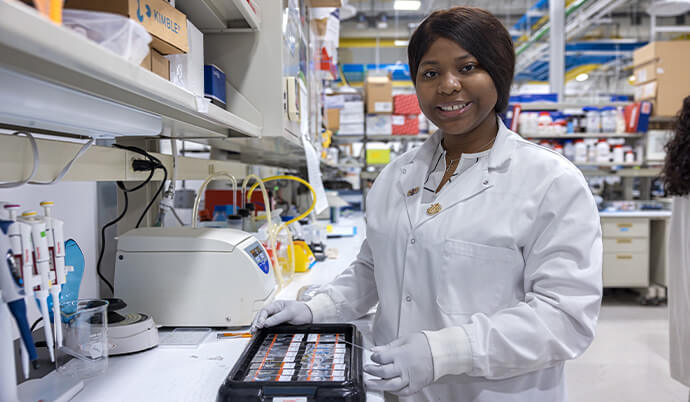Alicia Simmons – Finding a Home Away from Home

What leads a student from rural Mississippi to Sanford Research to pursue her PhD? That’s exactly the path that Alicia Simmons took to find her home away from home. Alicia grew up on a farm in West Point, MS, an environment that she likes to describe as “trees, grass, and dirt.” She grew up enjoying books and trips to science museums, so when the time came for college, she enrolled at Tennessee State University, a Historically Black University in Nashville, TN, as a Biology major and Chemistry minor. While in college, Alicia did research through the Tennessee Louis Stokes Alliance for Minority Participation program for underrepresented students in the state. That led her to do a summer internship at Vanderbilt University Medical Center, where she got her first “real science research” experience, studying the effects of chloride on the supramolecular collagen network in the kidney glomerular basement membrane. Through this experience, she learned that graduate school was an option for her future.
After graduating, Alicia continued working as a technician in the same lab at Vanderbilt for two years to make sure that graduate school was the right path for her. With mentorship from influential people who remain her mentors to this day, she decided that “science is cool” and made the decision to apply to graduate school. Coming to Sanford Research was not what she initially expected to do. “I was not looking to move to South Dakota,” she said, but “I was not afraid to try new places or new things by any means.” She applied to the Basic Biomedical Sciences PhD program at USD and was intrigued by the research opportunities at Sanford Research. “I want to answer the basic questions but in a way that is translatable,” she explained, showing how her own interests align with those of the biomedical labs at Sanford Research.
The decision to move to South Dakota came when she visited Sanford Research. She liked the faculty and graduate students, and she appreciated the open lab layout of the lab space. “It’s open format,” she said, “It’s really collaborative.” Describing the decision after her visit, she said, “I called home and said, ‘I think I like it.’ So, that’s how I ended up in this program.” Knowing that she would be moving away, she felt that Sanford Research “could be home.”
Now that she is in the midst of pursuing her PhD at Sanford Research, Alicia has found the collaborative environment she was hoping for. She describes a highlight to be “the network, the family; you get so many different forms of expertise in such a close proximity.” Pursuing her dissertation in Dr. Kamesh Surendran’s lab, once again studying the development and maintenance of the kidney, she has been able to learn new techniques from labs working in other disciplines, from bioinformatics to microscopy. “I can absorb all those expertise, and take and learn and build,” she described. “That, I think, has really had a great impact on my career.” She has also found a family in the graduate student community. “Whether you’re having a good day or a bad day, there’s always another student to talk to, and we all have this network of friendships inside and outside of science.” Within that community, Alicia feels like she has indeed found her home away from home.
Looking toward the future, Alicia is interested in a career in academia. “What really attracts me to academia is the mentorship,” she said. “I really like engaging with the students and trying to share what I know … Not even just sharing the science, but the life experiences that I’ve had that helped me evolve as a scientist.” She sees her time as a graduate student at Sanford Research as “the building blocks,” valuing opportunities to volunteer with the PROMISE Lab and mentoring SPUR students working in the Surendran lab to develop her teaching and mentorship skills. “It’s the beginning of my career,” she said, “so all the things I’m learning now are leading up to the hopefully great scientist that I will be and mentor that I will be.”